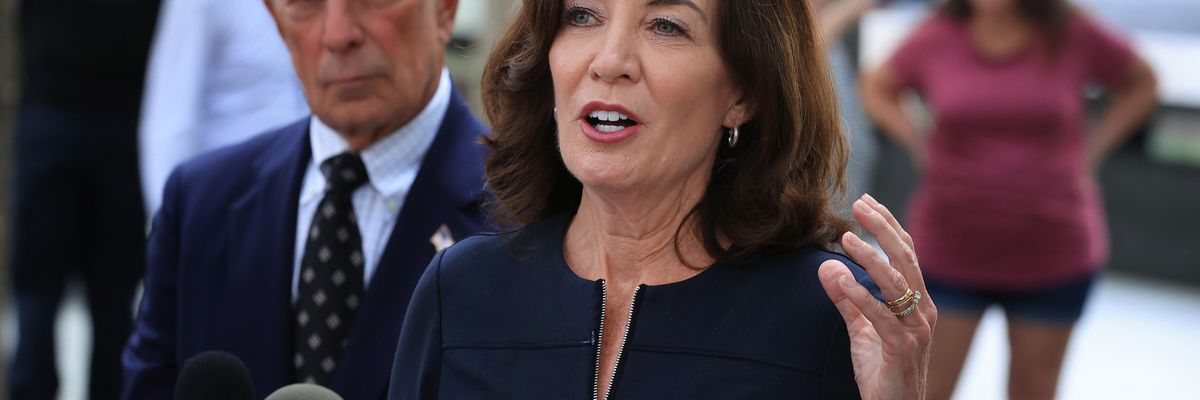Days after dozens of
law professors joined several rights advocacy groups in warning New York Gov. Kathy Hochul that nominating Judge Hector LaSalle to the state's top judicial seat would "take our state's law in the wrong direction," the Democratic governor announced that she'd chosen the conservative judge as the next chief judge of the state Court of Appeals.
The nomination was described as
"mystifying" and "horrible news" by legal experts including public defender Eliza Orlins, who pointed to LaSalle's record on abortion and labor rights as reasons that he was "potentially the worst of the seven nominees" the governor chose between.
"Deeply disappointed in the governor's nomination of someone with a clear anti-union, fundamentally conservative record on the bench to be chief judge of the New York State Court of Appeals."
LaSalle is currently the presiding justice of the New York Supreme Court's Second Judicial Department, and as Alexander Sammon and Mark Joseph Stern
wrote at Slate, "his record as an intermediate appeals court judge demonstrates a deep hostility to the very values that Hochul claimed she wanted to uphold with this appointment."
In 2017, LaSalle ruled that a so-called "crisis pregnancy center"—where people are pressured into carrying unwanted pregnancies instead of obtaining abortion care—should be shielded from the state attorney general's investigation into whether the facility was practicing medicine without a license. The judge invoked the First Amendment when he ruled that "advertisements and promotional literature, brochures, and pamphlets that the [center] provided or disseminated to the public" should not be investigated.
He also joined other judges in 2015 in handing down a "shocking" opinion, Sammon and Stern wrote, that allowed Cablevision to sue union leaders for criticizing the company's response to Hurricane Sandy, and ruled in 2014 that a criminal defendant should be blocked from appealing his conviction after the defendant claimed he'd been subjected to an illegal search.
Although Hochul claimed she was planning to nominate a chief justice who would help "defend against [the U.S.] Supreme Court's rapid retreat from precedent and continue our march toward progress," if LaSalle is confirmed by the state Senate to a 14-year term, he "would entrench a reactionary majority that would fight tooth and nail against the priorities of New York progressives," wrote Sammon and Stern.
Within hours of Hochul's announcement, several state senators had already said they would vote against LaSalle, whose nomination comes months after the U.S. Supreme Court
overturned Roe v. Wade, as Republican-led states across the country are restricting abortion rights, and amid high-profile nationwide unionization efforts.
"It is not hypothetical to say that New York's chief judge must defend workers' rights, bodily autonomy, voting rights, and so much else being attacked at the national level,"
said state Sen. Gustavo Rivera (D-33). "The U.S. Supreme Court has already demonstrated that they will actively erode what we have fought so hard to secure."
"This is not the time to place a person at the head of our appeals court who could weaken the ability of our state to defend us from these national attacks," he added.
State Sens.
Jabari Brisport (D-25), Julia Salazar (D-18), Kristen Gonzalez (D-59), and Samra Brouk (D-55) have also made clear that they will vote against LaSalle.
Some observers noted that Hochul's nomination of LaSalle comes weeks after the governor narrowly won reelection and a redistricting map approved by the state's conservative judges was
blamed for helping Republicans win a majority in the U.S. House.
"The blast radius here is huge, with national implications,"
tweeted Sammon, noting that LaSalle's confirmation would "lock in a conservative majority until 2030" in the state and harm any chance Hochul's own party could have of securing a fair redistricting map.
"The New York Democratic Party's ineptitude is fast becoming a national crisis," he added.




